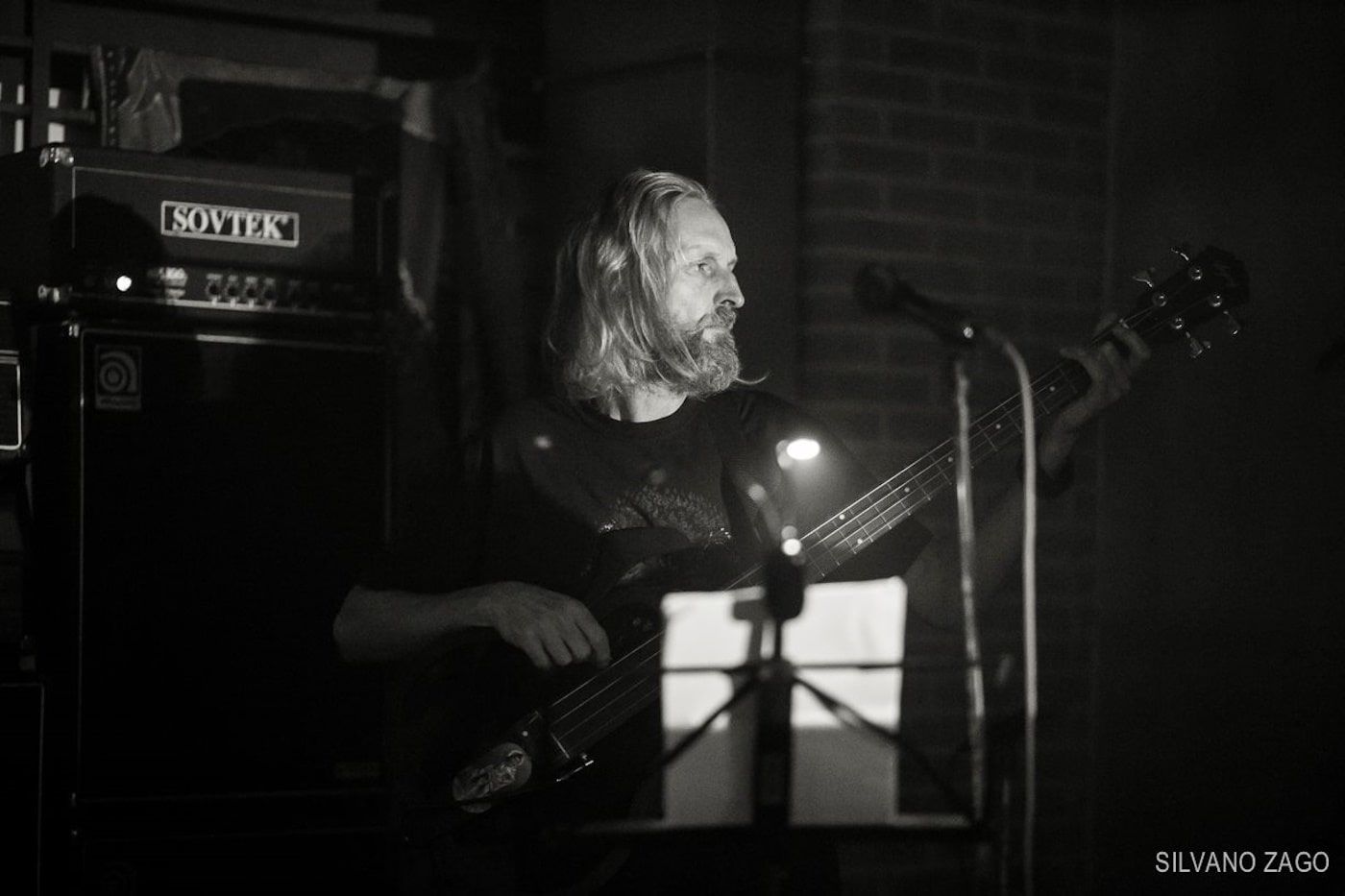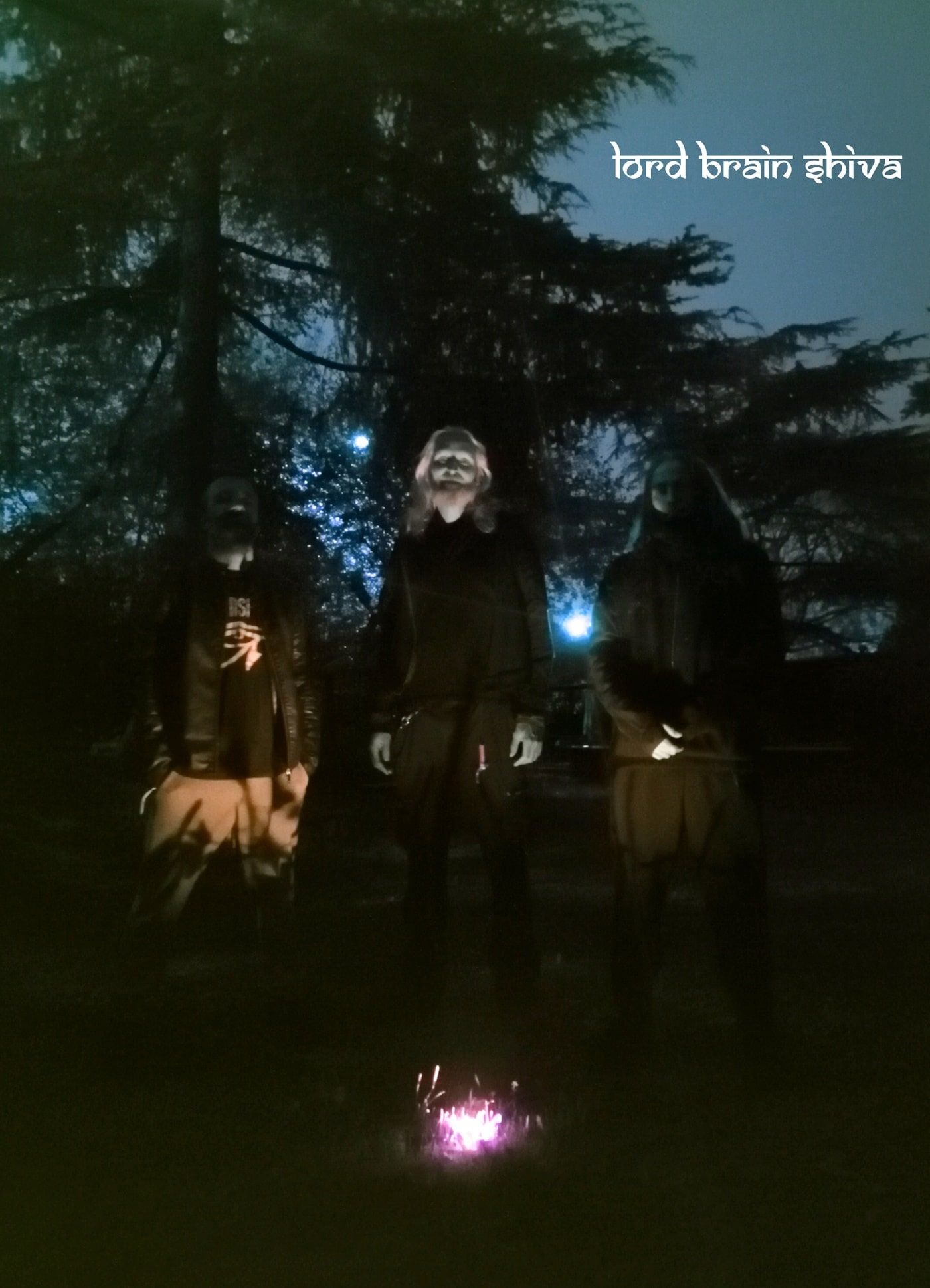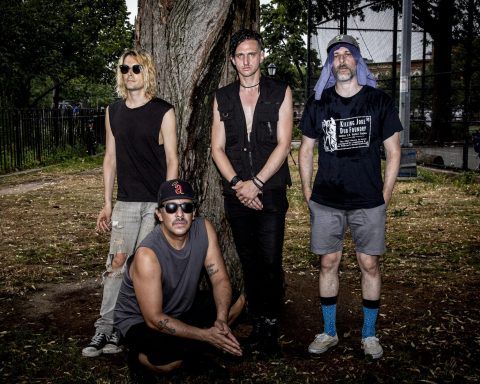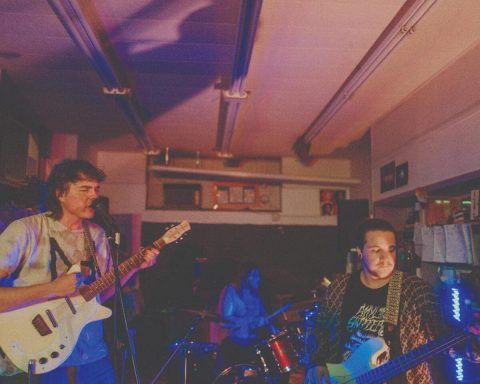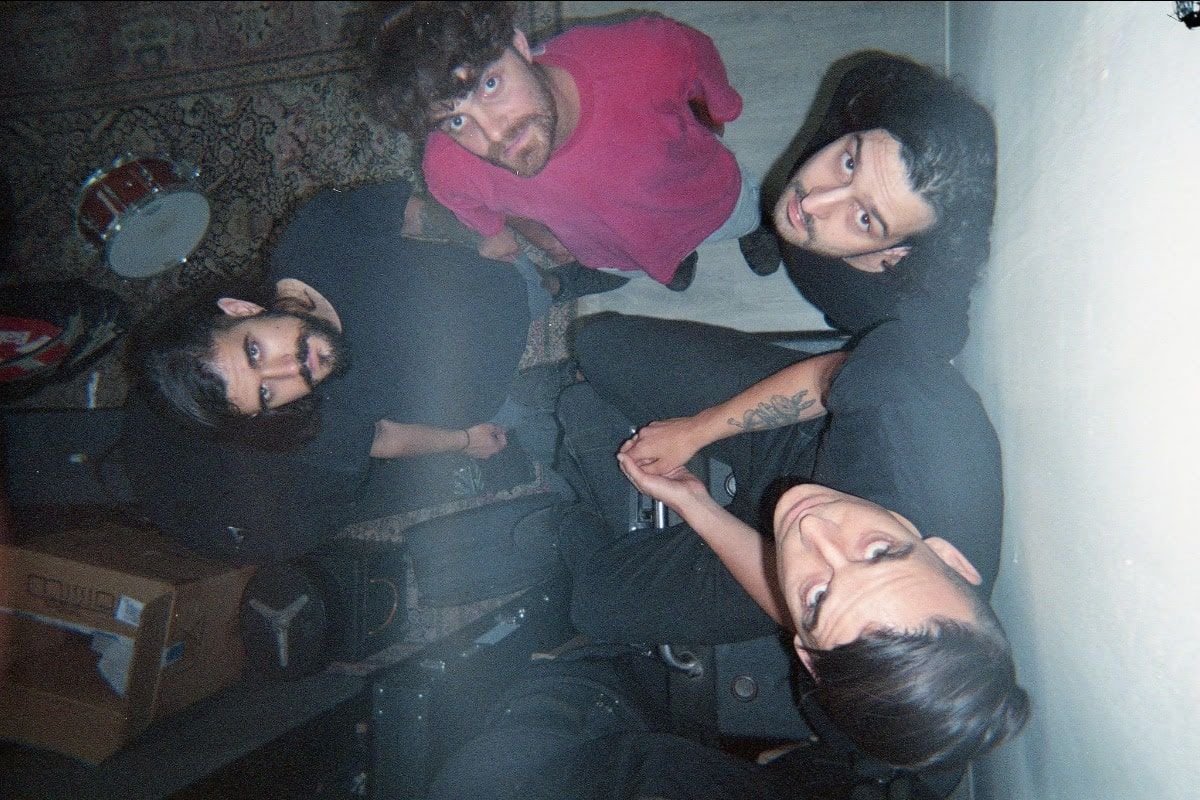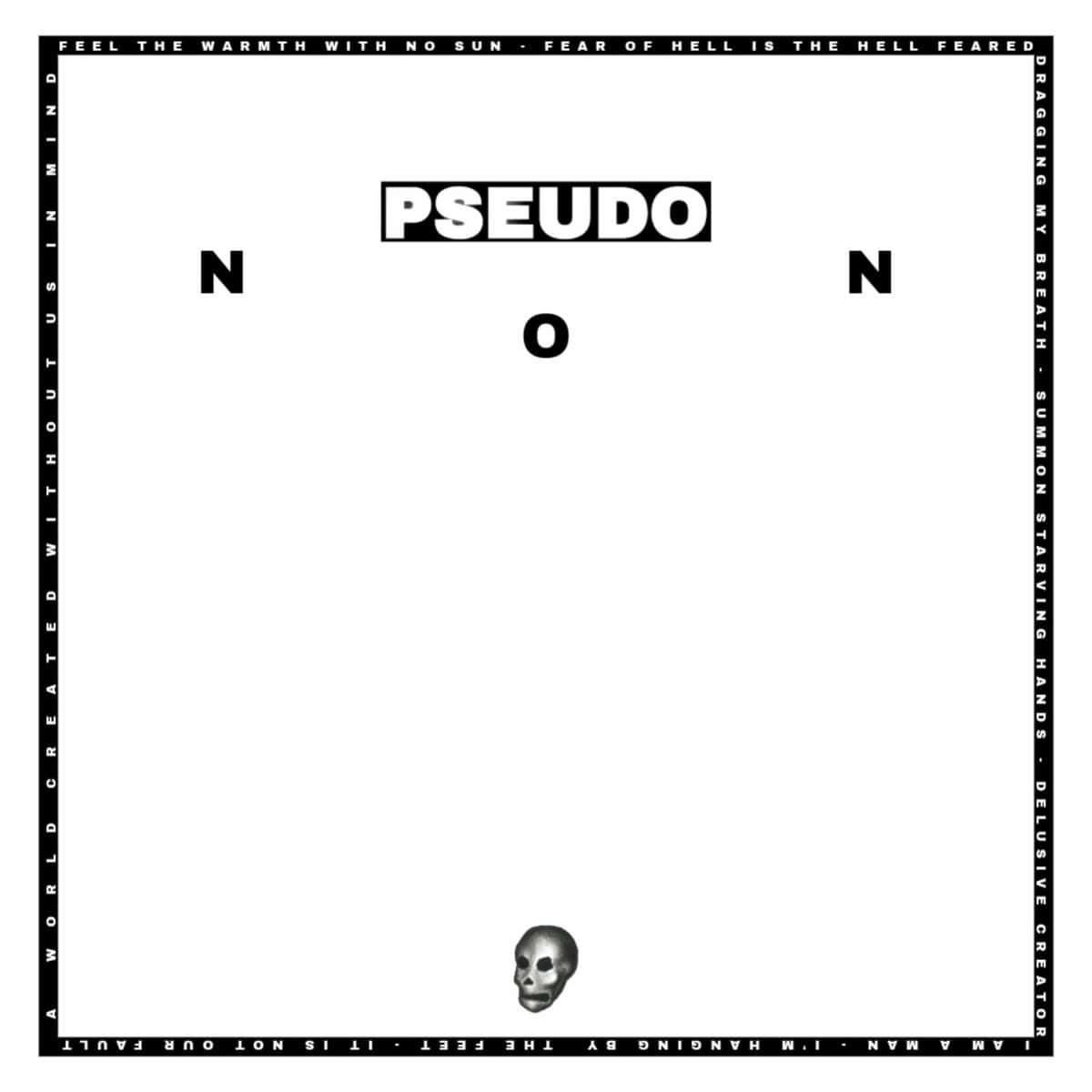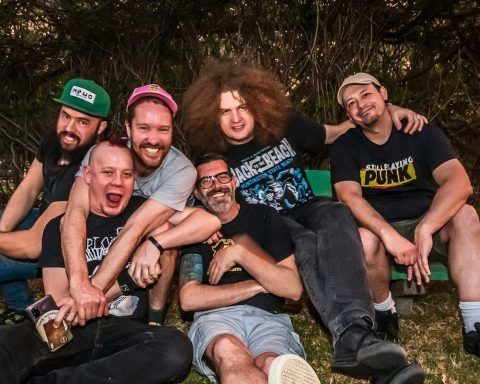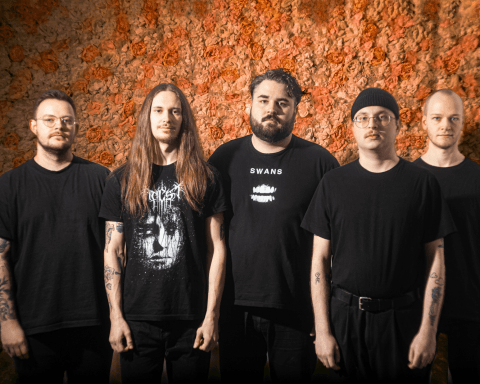Welcome to the musical labyrinth of LORD BRAIN SHIVA, where the mystic and the material collide in a thunderous echo of sludge-infused mantras. In their latest offering, “Trisula“, this Verona-based trio delves deeper into the soundscapes they’ve charted with their distinct Himalayan Sludge sound—a fusion where East meets West in a dramatic confrontation of cultures and sounds.
Formed over a decade ago, LORD BRAIN SHIVA consists of Davide Bazzani (aka Aum Shadu) wielding the guitar, Giulio Spiazzi (aka Ek Baum) handling the bass and vocals, and Manuel Marini (aka Manhuman) on the drums since 2020. Together, they craft a tapestry of sound that blends the hypnotic appeal of Eastern mantras with the gritty depths of Western sludge rock.
The album “Trisula” represents a pivotal third chapter in the band’s discography, bringing forth a blend of longer, more complex compositions and an ambitious exploration of thematic and rhythmic structures. Each track is a sonic journey through the band’s ever-expanding universe, incorporating elements of space, doom, and even a touch of German expression in a tribute to anarchic spirits.
“Trisula” delves deep into the introspective and mystical aspects of existence, blending dense sludge rock with ambient, mantra-like soundscapes.
Each track on the album serves as a meditative exploration into various themes such as enlightenment, existential reflection, and the cyclic nature of life and rebirth. Drawing heavily on Eastern philosophy and the cosmic cycle, the album is framed around the powerful symbol of the Trisula, Shiva’s trident, which represents creation, maintenance, and destruction.
This motif is echoed in the music’s structure, which shifts from intense, rhythmic complexity to serene, melodic passages, reflecting the band’s journey through dark, introspective realms towards a cosmic understanding of the universe’s perpetual transformation.
Stay tuned as we dive into the soul-stirring essence of “Trisula“, accompanied by an exclusive, track-by-track commentary provided by the band. Delve into this heavy, yet balanced soundscape where each composition acts like a dark mantra, inviting listeners into a mystical, bleak entrance to musical transcendence.
Rising eclipse
Giulio Spiazzi/Ek Baum: From the darkness of a Himalayan cave, the mind of a solitary ascetic creates an upside-down world, slowly weaving its own internal litany with the glacial currents of Earth and Cosmos. Orion is too bright to look at. Perhaps the avatar of his tilted destiny has led him into unacceptable stretches of the neocortex, where crystalline reason cuts through the skullcap to join the stars. Awareness is said to come from sudden, blinding explosions, from obsessive drum rhythms, from the parchment dream of an old scribe on the threshold of death.
The darkness has come, slowly enveloping the spectrum of the visible, silencing the night birds, watching like a monocled god the last remnants of the ambitious animals before plunging them into a cosmic sleep that has no awakening. Shiva’s Damaru now beats slowly, sinking appearance into a new destiny. Who and what will ever emerge from the dawn of ever-changing worlds? An eye closes the possibility of vision for millennia, a mouth devours the poisonous Halahala, a Trisula opens the way beyond the last possibility of reincarnation. The eclipse restores the light, now coloured black.
Davide Bazzani/Aum Shadu: The belief that it would be the opening track of the new album, Trisula, was always clear from the beginning of the composition, when Nicola, the previous drummer, was still in the band. However, he did not like the length of the track. The opening mantra simultaneously liberates and attracts the vehicle of thought that is about to plunge into the pregnant and saturated atmospheres of Trisula.
An immediately distorted, odd-time attack punctuates the entire first part of Eclipse. We were united in the knowledge that this new song was monolithic and much more articulate than previous compositions. The cosmic whirlpool we imagined by interlocking the different rhythms leads to a path of ascent into the meanders of the human mind, the earthly essence, being surrounded by different emotions depending on how much we want to be enveloped by the atmosphere around us.
Manuel Marini/Manhuman: This is the longest and heaviest track, certainly one of the most intense and one of my favourites on Trisula. It is a suite in 3 parts (the number 3 recurs in many of the structures of the tracks that make up Trisula), which begins very aggressively and then, in the middle part, flows into moments bordering on drone, ending with a cosmic opening.
It was clear from the start that with its opening mantra and soaring intro, this would be the opening track, Trisula’s calling card, making it immediately clear what the listener was getting into. I remember when I joined LBS in 2020, it was almost finished and it was the first track I worked on, not without effort, especially because of the strange rhythm and structure of the first part. For a long time, and for the first live performances, the last part was even twice as long.
Al Cisneros
G: An encounter, a soundtrack to life, a look of devotion in a ceremonial suburban context. Yet these vehemently repeated phrases help us to understand a style of salvation in its alienated actuality, tangent to everyday reality. Far, too far, from constructing horizons of meaning, like pulling the trigger to extinguish one’s own or another’s existence. Thus one stands at the antipodes of Al Cisneros’ rhymes, suppressing the search for meanings beyond appearances, burning the candle of one’s own envious mode of judgement to get as far away as possible from the concepts expressed by Al Cisneros.
To think and act what one hates, with self-destructive rage, chasing deadly games, without knowing responsibility, to flee from Al Cisneros’ advice by justifying untenable speeches, driven by piety, visceral hatred, having given up being authentically oneself, accepting oneself as one is and becomes, distancing oneself more and more from Al Cisneros. This means scattering “rays of ancient wisdom”, piling stones on the head of an existential bass guitar that cannot play, far from the seething, mystical, beneficent notes of Al Cisneros. Better a day among the swans than an eternity in oblivion.
D: This ode to the beloved character of the sludge universe was born from Giulio’s bass line and the complementary ironic lyrics dedicated to…
Immediately conceived as a tight song, without much expectation or atmosphere to look for, but rather as a flash that immediately strikes and, thanks also to the final part added later by Manuel (who joined the band when we were already in the writing phase), transports us into the sludge sludge we are dedicated to.
M: We chose it as the first single to introduce ourselves because it is the shortest and most direct track on the album. On each of our records there is a track dedicated to a real person: Ashokapur on the first self-titled record, Mahatma Ghandi on the second (Dakshinamurti), on Trisula we dedicated this track to someone we love very much: Al Cisneros (Sleep, OM, Shrinebuilder). Personally, I see it as a kind of evolution of The Traveller from the second album, both short tracks based mainly on impact and groove. Al Cisneros was also almost finished when I joined the band, and I remember that when we started working on it in earnest, we were stuck in the house because of a lockdown, so to get Giulio and Davide to rehearse, I made a drum machine track that was as close as I could get to what I had in mind for the drum parts. I must have saved it somewhere; I had renamed it “Hall Cisneros” in honour of Hall 9000, the on-board computer from 2001 A Space Odyssey.
Shadow’s Ghost Tree
G: Plants hold ancestral biological knowledge. They create a survival society by gathering in forests and woodlands. The eyes of men roll desperately for light as they plunge into the endless dome of a dense, lush ocean. It is dusk when the last shadows split the vaulted semblance of plant life. A solar laser pierces the penumbra to announce the countdown of time, fleeing through the leaves. Again a quiver of wood, a whisper of bushes, blackbirds trudging to their nests, already invaded by weasels.
Darkness, silence, rustling. Blind shadows as the heart throbs. Glowing streaks of metaphysical fireflies. Silence. Still the throat holds an inner cry. A plea to the silent forest to become strigiform, to acquire night vision, peremptorily denied by the insidious appearance of a catching shadow. The base of the trunk swayed, transforming the tall ash into a ghoulish dancer, suspended between a desire to die and a test of initiation. But it is too late: from the marshy swamp that surrounds the fragile ankles, three sombre beats raise the hope of a new appearance. The spirit of the mind exchanges its skin for the spirit of the heart, for a hypnotic rebirth that determines the terra firma beyond the clearing.
D: “The ghost of the shadow of the tree,” “the tree of the ghost of the shadow,” “the shadow of the ghostly tree,” and other anagrams sparked by doubt about where to place the Saxon genitive materialised this ethereal and dense composition.
I began to hear this initial arpeggio wandering with thoughts and memories that referred to a silhouette present in the mist-shrouded foliage of a towering oak tree. I liked the ethereal, extended effect of the first notes, enhanced by two delays, echo and reverb, which blended together both as I plucked the strings and as I tapped the body of the guitar to raise the blanket of shadow towards a feedback held back from the beginning of the notes.
After a hidden and hesitant introduction, accompanied at various times by the entrance of all the instruments, we linger on the essence of the ethereal presence. Then the manifestation of the latter becomes blurred, entering the central part of the song with a riff charged with distorted energy (as reality often is), acquired by pausing in the shadows… an unconventional rhythm and full chords accompany, with the entry of phasers and the chorus, the composition to the final part, punctuated by the wispy notes of the bass, becoming again, like the opening, a more canonical tempo, left hanging in the finale.
Thanks to Manuel, we were able to frame and stop notes and time that we would never have been able to create without him.
M: Instrumental, like every track number 3 on our records, it starts with a very dark, dark, foggy arpeggio by Davide (guitar), and then flows into one of my favourite riffs on the album, crooked and cosmic again. The ending, on the other hand, I remember coming from an idea of Giulio’s (bass), which turned into the most “doom” moment of the whole album. Being an instrumental, we often choose it as a live opener.
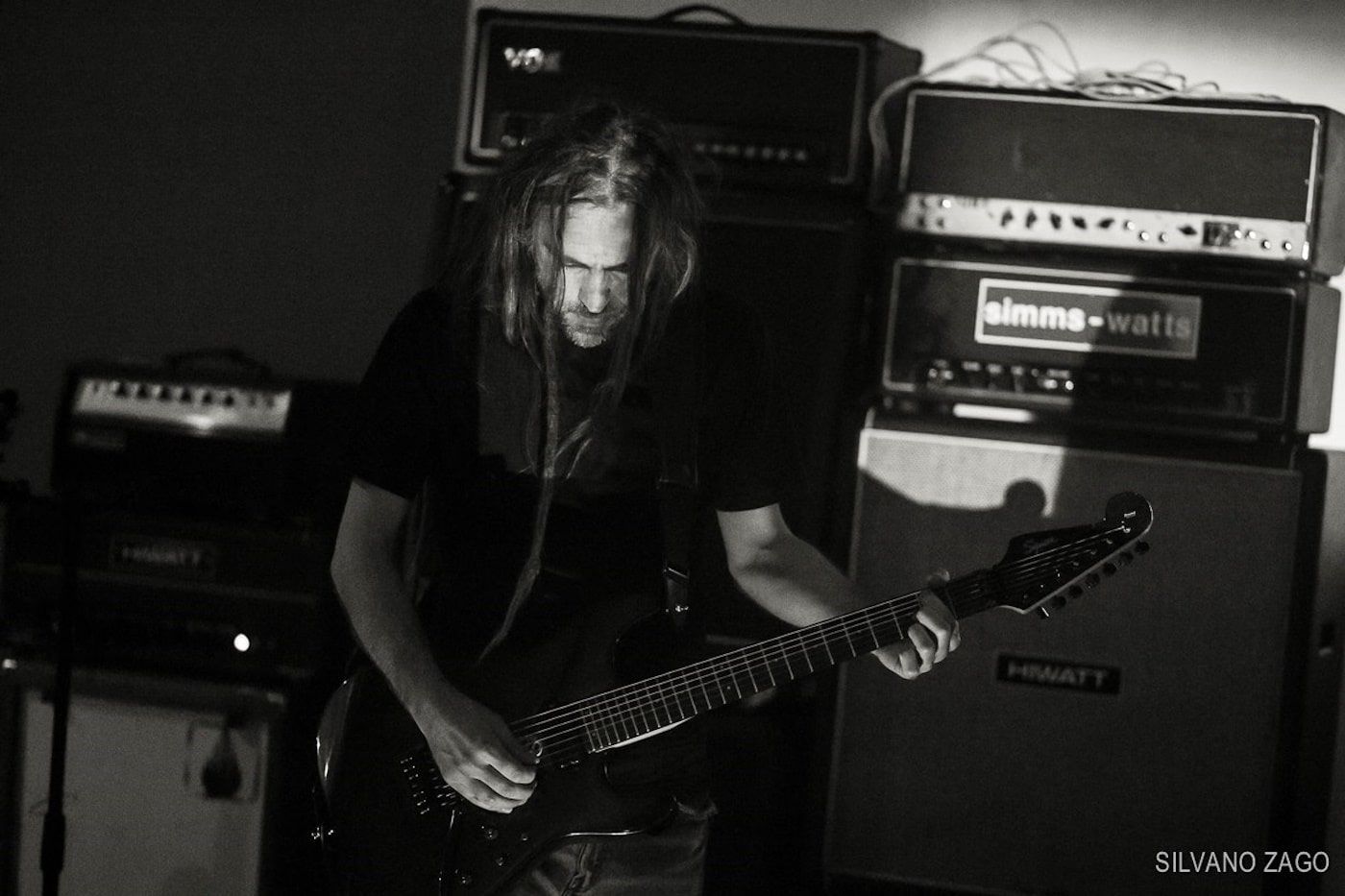
Varuna
G: “Om, let us meditate on the reflection of the water. O Goddess of the Blue Ocean, give me a higher intellect. And let the water god enlighten my mind, Om,” recites the Varuna Gayatri mantra, as notes of rooting harmonics etch the repeated and constant waves of boundless uranic reach. Varuna, seated on the Makara, his vehicle in the form of a hybrid crocodile-fish, travels to all the places of infinity, gazing with starry eyes into the present of man, woman.
The rivers Ganga, Yamuna, Narmada and Godavari stretch under his gaze, bringing life and prosperity to their banks. He converses with the drowned by guarding them, judges and punishes the wicked, those who create discord with lies. The first of the Ādityas, he reigns with justice over the dark half of the sky, over the unknown course of the night sun, presiding over the cosmic order to which all reality is subject. Makara’s precise footsteps open the celestial canopies, bringing down abundant rain on the timeless drum snares, while the litany, turned evocation, calls out to the guitar strings, thrust into the gurgling of the celestial waters. It is a call for the awakening of the nāga, the sacred serpents of darkness, the beginnings of reality, those who with the ritual bite bestow omniscience, the power of humility.
“O pale, monstrous-riding knight, show us the reflection of thy golden armour, wrap with thy destiny ophidian noose the baser snares of our earthly progress, that the unnamed abysses you rule may be the refuge of our purified being”.
D: Definitely the most intimate and meaningful track on the album. The introduction, with the mantra sung by Julius, immerses us in the Vedic atmosphere, punctuated by the beats of the kettledrum and the constant resonant note at the beginning. Like an opening of the cosmic order to which the deity is linked, the first notes accompany us on the path of meditative prayer, underlined by the effect of the voice with deliberate evocative repetitions. A kind of mantric conduction takes shape, dictated by the repeated succession of guitar notes, always the same but always different, with interlocking little facets given by the addition or absence of notes on each beat.
The sparse drumming during the sung verses carries the instruments in unison with the perceptions. A small structural change marks the end of the mystical moment, only to return and refine again, resulting in a sonority that addresses Varuna’s stern, ethical behaviour. A recollection of celestial phenomena emerges without warning, as if to move immediately into the cosmic mud of the post-Mantric order. In this unstructured manner, with a deliberately complex numerical sequence, all the instruments are transported from Vedic reality into moments of celestial darkness to guard the willful souls.
M: Another very long and structured track, a real hypnotic and captivating prayer journey, thanks mainly to Davide’s guitar atmospheres and Giulio’s vocals. We worked a lot on it and it was very difficult at first to make it sound its best because of its delicacy in the first part, but we are very proud of how we managed to record it and of the intensity with which we are now offering it in live performances. The final deflagration has a peculiar structure of turns in a sequence of 4-4-3-3-2-2-1-1, where the first half of each pair of turns also has an odd time. Another highlight of the album for me.
Karma Lete
G: The river of existence flows, marked by the perception of a stretch of consciousness. The dam of birth marks a boundary between a path of darkness and a path of clarity. Then shadow again. High buttresses channel the days to be lived. Karma floats relentlessly, trying to reach a mouth, often far away. How many passages? How many forms? What possessions? As in Francis Bacon’s paintings, where flesh drips like candle wax, where the security of one’s own image slowly melts away, turning recognition into a mocking duel between past and present.
Tunnels wedge themselves into tunnels, opening the last shining eye for a moment, only to fall back into an endless and even more beginningless cyclicity. It is like Er’s journey into the other world, balancing between memory and oblivion, between memory and forgetfulness, between economy and thirst for annihilation. Meanwhile, the river flows between the colours of the liquefying canvas, between the sacred grandeur that crumbles in the now cleaving rays of threads no longer merely earthly. The cause of the fate of living beings: action. A raft in the current, a foothold in the rock, a brushstroke on the canvas, a mouth wide open like an inhuman maw when a rushing breath returns to mark the next fate.
D: The lyrics of this song were written by Giulio during the creation of Dakshinamurti, and were initially put aside in order to give priority to other ideas that were more concrete at the time, in order to complete the record. The idea and the desire to build something on it remained firm over time. With such intimate meanings and references, the desire to create a unique sonic and instrumental architecture came naturally. Over time, having acquired various effects to process the guitar signal, I chose a whammy/octaver to approach the muddy banks of the Lete River. I often draw inspiration from Julius’s wise lyrics, which touch me deep inside and trigger riff ideas and sounds to accompany them as they develop.
The beginning of the song, punctuated by the introduction of the drums, evolves with strange, dissonant and unconventional rhythms, acquiring its own structure formed by 3 sequences that are repeated cyclically, then leading to a similar repetition of notes, but performed stifled and held back by the river and its karma, where the delay takes its course, channeling the structure towards the opening of this concrete vision. Navigating in suspension between sections divided into 9, 9, 8 turns, first scanned, then restrained, we bring our attention back to the individual words that form the evocative course of the path taken. The succession of alternating notes from a 2,1,3 / 1,2,3 / 3,1,3 structure punctuates the channeled course of a sequence, first played in an ascending manner, then shifted in a descending and opposite repetition, fluctuating as if the current of the river changes direction, creating eddies that envelop and suck our limbs. This feeling is maintained until the end of the chant which, with intimate repetition, sustains the elevation of the soul to personal and divine detachment.
M: A song that requires great attention to the execution in order to be at its best, especially in the tumultuous first part, which then turns into something that personally reminds me of certain Tool from the last two records. In the second part, the typical “Lord Brain Shiva sound” mantric and hypnotic of our first two albums returns, with Giulio’s lyrics and vocal lines extremely engaging.
Stupas
G: The mind swirls like a bee flying in the lemniscate, feelings of bodily detachment. Overwhelmed by a complex hubbub, almost an embroidery from a book of dark magic, righteous thinking goes numb, fades, stumbles over itself. It is at this moment that the temple monkey picks up the spoils of thought, tangles them between its gripping fingers, plays with them and then, almost defiantly, jumps onto the balustrade. The grip is sure, expert, cautious, and it releases the mind into the outer circle of stakes and spears, a protective fence, not yet of stone. Here the mind descends to the foundation of the stupa, to the most precious base of the structure, to the beginning that will envelop the unfolding of the speculative dimension.
There is already a first layer, a dome that rises like a hill of memory. La reliquia più preziosa è quella piccola frazione di sacralità vissuta, espiata, tramutata in cenere. Le porte ai punti cardinali si spalancano creando un vortex d’aria freschissima, un turbinio di riflessioni sul valore dell’esistenza, del Singolo, della Legge Cosmica, della Comunità. Se è pur vero che mani esperte assolvono il compito prezioso di costruire, avvolgere, mantene e rafforzare l’edificio cristallino del Pensiero, un mondo di confusione concettuale, di istinti di bramosia, di insensatezze tracimanti delle chiacchiere mondane, è altrettanto chiaro che la natura di un corpo umano, animale, vegetale e minerale è la reale dimora senza aggettivi di una esistenza/vita condotta all’Azimuth.
D: Once again, the evocative lyrics, told as a cosmic sermon of an intimate and propitiatory nature, bring out mystical-oniric notes that mantrically accompany the prayer as it unfolds. Deliberately, it is the only piece in Trisula without a particularly driven distortion, precisely to emphasise the sacredness of the text. Here, too, a cyclical structure is repeated, with alternating rhythmic disparities and time-shifted accents designed to fluidise the ethereal atmosphere. Throughout the development of the song we cyclically approach the sacred relics, underlined by the echo effect that envelops the voice as it punctuates the worship of life.
M: Trisula’s most atmospheric and ethereal moment. Introduced by a long, melancholic arpeggio, it develops into an urgent, haunting riff with the entrance of Stupa’s evocative vocals, and then builds to a very intense final crescendo. The whole song is based on an odd-time structure with shifted accents, and the percussion is played with mallets only on the timpani and cymbals, creating a more muted sound that accentuates the dreamlike mood.
Klesas
G: Slow, steady, subtle rain in the soul of fragility. Different visions for a single perception of ensemble reality. A challenge for those who can see into the future. Thoughts swirl and form logical circuits, but it is feeling that opens the high road to perception. Consequently, the vortex that resides in the underground of being, like a wind, shakes the foundation of the stone house. You find yourself whirling up the vortices of an incomparable existence. Take it as it comes, what else? Immediately, the hammer of the “countdown” rumbles through the rooms of restlessness, giving no chance to pretend to ascend. And again the rain becomes more subtle: duality, the restless state of being, a tendency towards guilt, the sullenness of those who cannot come to terms with themselves. All is swept away by the warm volutes of pleasure, vitality, the balanced harmony of suspension. The predictions you thought you had made were radically wrong. There is no turning back from the tunnel, and perhaps at the end there is only the Minotaur in the Theseus version. Anxiety, fear, anger, jealousy, longing, depression, affliction, contamination, destructive emotions, disturbing emotions, negative emotions, mental poisons and neuroses: squeezed between the three spokes of a spinning wheel, ignorance, attachment and aversion puncture the stomachs of resigned humanity with unhealthy roots to soar like feathers carried by the soul in the transformation of a morning puja.
D: This other prayer, born of sensations of deep and quite different realities, leads the listener to a perceptible elevation through an evocative immersion characterised by rugged chills that penetrate the spirit in body and mind. An altered state of mind, in fact, that takes the mind to several different universes wrapped in an indissoluble deep bond. It was born as Trisula’s last composition, rehearsing and rehearsing the various parts several times, trying to bring them together as cohesively as possible. Beginning with an arpeggio created to caress related dreams, she adds, after a slight nuance, the singing that leads to the discovery of thoughts beyond the ordinary.
This leads to a succession of untroubled notes and emotions, free from the canonical constraints of a life without energy acquisition. The sequence of development draws its strength more and more from the punctuated union of the individual instruments, which weave their way through the flow of events like sanguine streams that bring life, growth, death, accompanying discoveries that make the events unforgettable in an unforgettable way.
A deep, complete, eloquent and difficult composition to honour all that the mind magically embraces in each of its discoveries, not always easy.
M: The last piece composed for Trisula. After a soft, melancholic intro with particularly touching vocals, it slowly gets into the heart of the piece to arrive at the final syncopated and pounding crescendo. Personally, I think it is definitely one of the most successful, but also one of the most complex to perform!
Improzeit
G: He turns the turntable and spins out Delta Blues. Mechanical, dry, precise shots from automatic weapons. Banners on the streets of a Europe that no longer exists. The strategy of reaction is to suppress the uprising. Rage, death, destruction against revolution, blood, freedom. Those who tremble must expect this. You cannot always expect to get away with it: if you sow wind, you will reap storm. The wickedness of the system does not go to the strongest, but to the children of young rebellion. Streets bloody with the metal bile of the Dominion. Fields, factories and workshops breed legions of dreamers willing to pay too high a price with their lives for a bourgeois continuity that fuels the bloodiest wars on Earth, that erects statues of glittering cowardice and ingratitude in the dreary theatre of muscular gain. Knights of the blues, swept away in the forgetfulness of your sacrifice, amidst the swirls of new radioactivity-laden chilooms, the Delta Blues continues to play even in the background. Armed struggle is driven struggle. Instead, what remains between the wounds is the “pirate making” that will not go out, burning like embers under the feet of the criminal state. The open-air massacre you are giving us reckons with the sweetness of improvised notes. 2 June 1967 – 2 June 1980: Revolution, blood, free
D: A composition born from the first notes, punctuated by Giulio’s bass and accompanied by the swirl of German lyrics, accompanies this tale of life in a remarkable niche. It begins with the resonance of beating skins, deliberately sparse to emphasise the industrial atmosphere; the events are accompanied by the entry of the pressing bass in a mechanical rhythm and, in a second moment, by a slender guitar that makes fluid substances flow and channel. The rhythm, punctuated by the instruments, repeats cyclically like the movement of a cog in a system, all supporting the individual words of the cantata, which inexorably communicate the devastation that fate could not avoid. In the end, only silence justifies the revolution that, through blood, has brought freedom.
M: Trisula closes with Improzeit, dedicated to the slaughter of a German anarchist group from the 1970s, Der Blues Rebellen Des Ashish: definitely one of my favourites both to listen to and to play.
This track was also almost finished when I arrived, and while it was clear from the outset that Rising Eclipse would be the opener, Improzeit found us all agreeing to place it at the end of the record due to its atypicality. After a seven-track dreamy-metaphysical journey, it seemed right to bring the listener back down to earth, to stark reality. Improzeit was decidedly less aggressive at first, then slowly built into a caustic crescendo from the minimal tribal-urban intro to the final, peremptory, liberating “Revolution! Blood! Freedom!”



